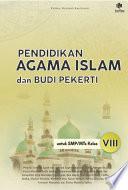
Surat Kabar Pemimpin Belajar 004 - Pemimpin yang Menyukseskan Pembelajaran Berbasis Proyek
Surat Kabar Pemimpin Belajar lahir sebagai upaya mengajak calon dan pemimpin pendidikan berkolaborasi menyediakan dukungan kepemimpinan. Dukungan dalam bentuk kumpulan praktik baik kepemimpinan pendidikan yang praktis, terbukti dan merdeka belajar. Topik perencanaan proyek pembelajaran mencakup praktik yang memfasilitasi guru menerjemahkan kurikulum satuan pendidikan menjadi perencanaan, pelaksanaan dan penilaian projek pembelajaran lintas pelajaran. Cakupan tersebut bisa meliputi tapi tidak terbatas pada identifikasi cakupan pembelajaran, penentuan asesmen, menyusun strategi pembelajaran, penentuan sumber belajar dan perencanaan kegiatan belajar. Topik refleksi dan pengembangan mencakup praktik yang memfasilitasi guru, tenaga kependidikan dan warga sekolah dalam melakukan refleksi pengelolaan kurikulum satuan pendidikan sebagai dasar dalam melakukan perbaikan dan pengembangan kurikulum satuan pendidikan. Cakupan tersebut bisa meliputi tapi tidak terbatas pada pengumpulan data hasil belajar, refleksi berkala, pengumpulan umpan balik, analisis data hasil belajar, perbaikan dan pengembangan kurikulum satuan pendidikan.
- Judul : Surat Kabar Pemimpin Belajar 004 - Pemimpin yang Menyukseskan Pembelajaran Berbasis Proyek
- Pengarang : Pemimpin Pendidikan, Cerita Guru Belajar, Kampus Pemimpin Merdeka,
- Kategori : Education
- Penerbit : Cerita Guru Belajar
- Bahasa : id
- Tahun : 2022
- Halaman : 57
- Google Book : https://play.google.com/store/books/details?id=4WaaEAAAQBAJ&source=gbs_api
-
Ketersediaan :
Surat Kabar Pemimpin Belajar lahir sebagai upaya mengajak calon dan pemimpin pendidikan berkolaborasi menyediakan dukungan kepemimpinan.






